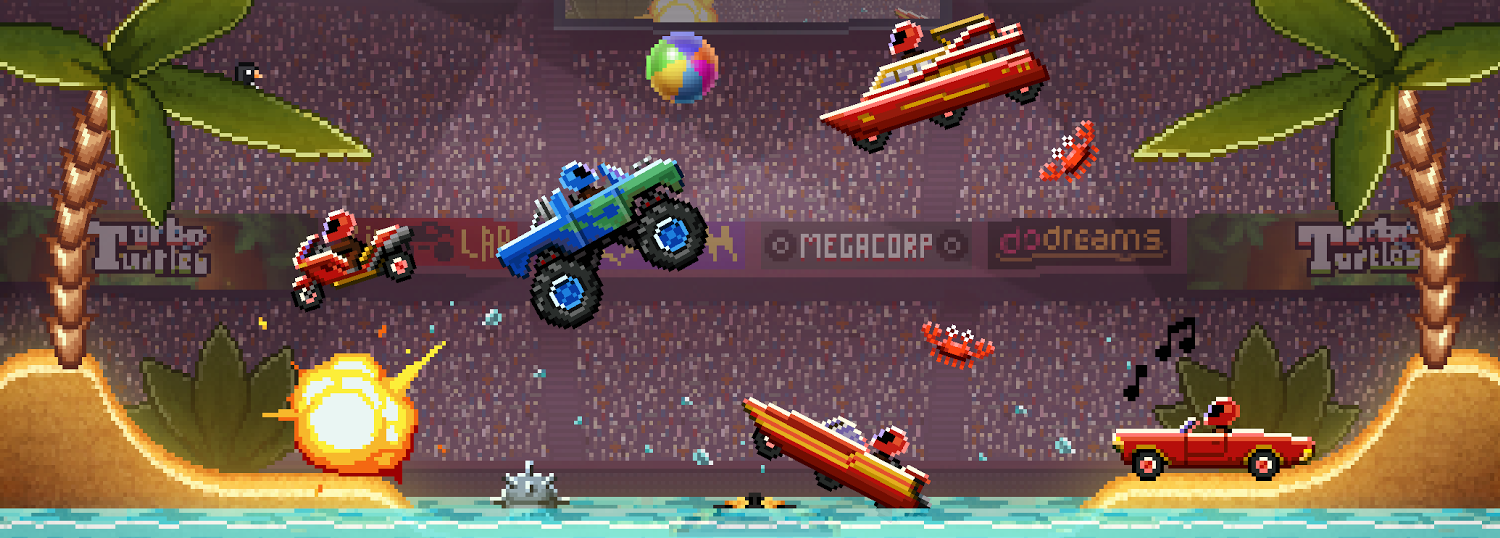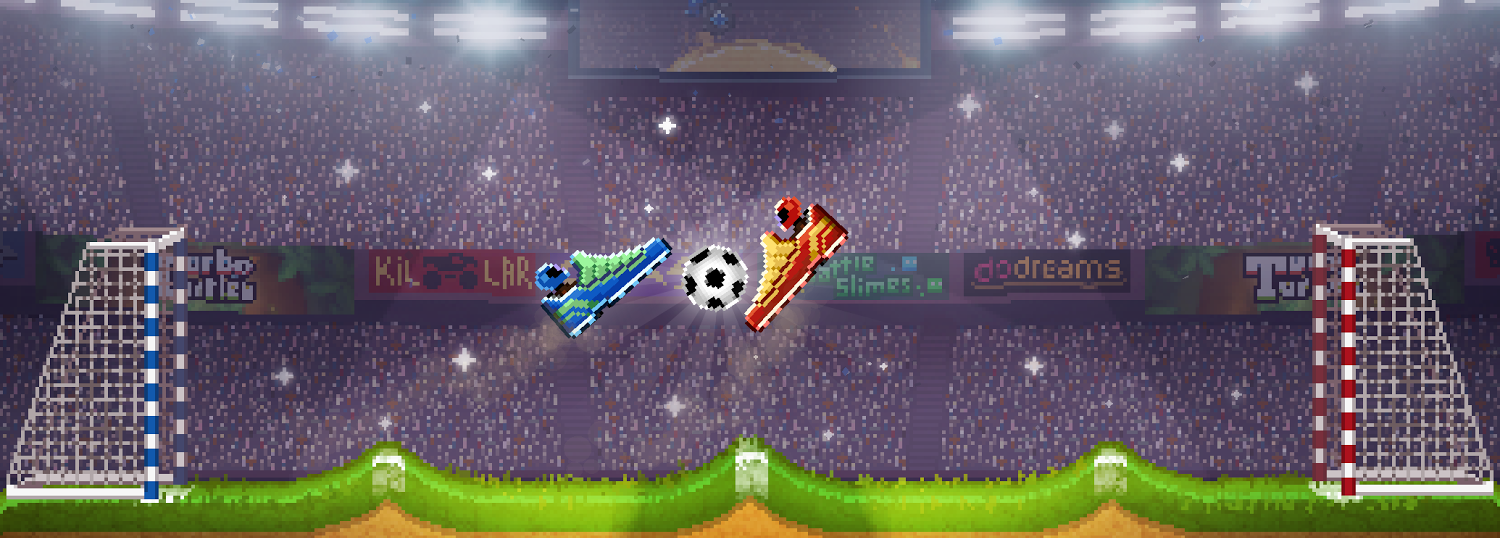The Finnish Dodreams team is known for Drive Ahead!. We talked with studio CEO Erik Pontiskoski about how the game was created with a MAU of 10 million and what an indie developer should be ready for.
This material is published as part of the “Finnish Gaming Industry” cycle. Its launch is timed to coincide with the event about the Finnish gaming industry Finish Game Day 2017. The event will take place on June 13. It is part of the White Nights Conference St.Petersburg 2017, which starts a day later, on June 14.
Alexander Semenov, Senior Editor App2Top.ru : Eric, tell us a little about the team.

Eric Pontiskoski
Eric Pontiskoski, CEO at Dodreams: Dodreams is a Finnish game studio located in Helsinki. There are 20 of us. We are the authors of the Drive Ahead series!.
This is a series about gladiatorial fights on typewriters, where you earn points by hitting opponents’ heads. So it was in the original title. The sequel is Drive Ahead! Sports – combines this gameplay with various sports disciplines, like football and basketball.
Our studio is one of the fastest growing companies in Finland. This summer alone, we have already hired 5 new employees (it is important to understand here: in 2016, the number of people employed in the Finnish industry increased by only 50 people, – editor’s note).
For many current employees, Dodreams is the first job in the industry. They are all great enthusiasts with lots of ideas. However, in recent years we have balanced the team with specialists from Rovio and Frogmind.
Among other developers, we stand out with a large and loyal community of players.
Usually users don’t want to spend time in communities when it comes to casual games. It’s different with us.
The fact is that video is an important component of Drive Ahead!. Since the game is based on real skills, players are proud of their achievements and like to share them with friends.
Their love for it made Drive Ahead! the second game in terms of the number of user videos on Unity’s Everyplay service (first place in videos for Geometry Dash). One million people have published five million replays.
More importantly, the replays have Drive Ahead! high entertainment value – even those who don’t play the game enjoy watching them. They are fun: the physics in the game is unpredictable.
The videos allow you to increase the fan base with the help of our own players.

You’ve just talked about the project in great detail, but I’d like to start by talking a little more about the Finnish industry. What do you think is the main feature of game development in Finland?
Eric: The best thing in the Finnish gaming industry is the developer community. There are monthly meetups organized by IGDA in many cities. It’s important and cool to meet with colleagues and get feedback on your games.
When I first joined Dodreams, I didn’t know many people in the industry. I started attending IGDA events armed only with my smartphone. I would approach strangers and say: “Do you want to check out the game?”. It was a great way to get to know each other and get advice.
Later, other professional events, such as monthly breakfasts for directors of gaming companies, were very useful for me as CEO of the company.
Our colleagues, who are also our competitors, brought us together with major international players, advised us on how to improve development and scale the business.
We are also very grateful to Tekes, the Finnish investment agency for innovation, which funded us. This allowed us to retain the team and focus on developing our own games.
Personally, I really like working on games in Finland. It’s a relaxed community where you can be yourself. The work, of course, is difficult, but it’s not that important, because I do what I love every day. And when you are surrounded by great people and studios, it is very inspiring and I think that such friendly competition, affecting everyone here, is only good.
Your biggest success, as I understand it, is Drive Ahead! And what projects were there before that? Why do you think today they have not achieved such success as this project?
Eric: Our first mobile game was the role-playing action movie Fading Fairytales, published by Crescent Moon. It was a very big project for our modest-sized studio. Despite a significant feature in the App Store and good ratings, the game was not commercially successful.
After that, we decided that working on one voluminous title was too risky for a small team. And they changed their strategy – they started creating mini-games.
We had three teams working on ideas that could be implemented and published in weeks, months at most.
So we released about 10 titles on iOS and Android in one year. At the same time, only half of the working time was spent on their development. We spent the second half on custom development.
The goal of the chosen strategy was to gain experience and knowledge. With each release and with each update, we learned something. Eventually, as part of the strategy, we released Drive Ahead!, which is our biggest hit so far.
The lessons we have learned from the development of mini-games are as follows:
1) Findability is the main problem for studios. You need to find a way to stand out in the eyes of users and in the eyes of distribution channels (App Store, Google Play). We have found our niche in games with local multiplayer, those projects that you can play with several friends on the same device.
2) We perceive our games as services, not products. This means that we regularly update our games, add new content, features and events. Our fans know from their own experience that we will never miss an update date.
3) Your game has been downloaded. It is clear that you want this user to return tomorrow – and not alone, but with friends, and not go back to the App Store or Google Play for something else. To prevent this, we try to make our game change every day and so that the player feels his progress in it.
Tell us about the history of the development of Drive Ahead!. How did the idea of this game come to mind and how long did it take to implement it?
Eric: Drive Ahead! it was invented by one of our developers. He showed us a demo in the office and everyone was delighted with the game. I’ve never seen anyone react so violently to any of our projects before. So the obvious solution was to put resources on this project.
The game was made as part of our strategy to release mini-games. The original version of Drive Ahead! it was created in a couple of months by a small team of two or three people.
The nature of success is explained in different ways. Some say that success is a matter of chance, others insist that it is a matter of skill and experience. What do you think about it? And what played a big role in your case?
Eric: Success is a difficult task.
I don’t think our studio is successful, we are still small.
Success is never exclusively accidental. He is born thanks to acquired skills and luck.
It is important to play a lot. Not only in the games that you like, but also in something completely new for you. I often download games just to understand why people like to play them.
Knowing the history of video games, you can start generating and implementing your own ideas. It’s like in sports: the more you practice, the better you are at it. That’s why it’s better to make 10 games quickly, instead of spending a year working on something cool (which you may never finish at all).
The luck here is as follows: the more games you release, the greater the chance that you will be lucky.
We’ve had some hard times, but I’ve never lost sleep. All because I was sure that we would solve any problem.

One of our investors likes to say that you can control your own destiny with the help of will.
Sometimes people tell me that the business in the gaming industry is built on hits and that no one knows which project is going to succeed. Or they say that a feature in the app store is a lottery. I believe that as soon as you start blaming other people or consider yourself a victim of the system, you are finished as a businessman.
I train young startups and always tell them two things.
First, defeat is inevitable, so accept it. The main thing is to estimate the risks in advance and how expensive it will cost you, so that then you can try again.
Secondly, success is also guaranteed, so believe in it.
You may find it quite differently from where you expected. Maybe not even in the gaming industry. But as long as you experiment with minimal risk and investment, surrounded by friends and doing things you love, you can count on him.
The only reason companies or indie developers fail is because they run out of money or they give up.
Drive Ahead! it was released in May 2015. In the summer of the same year, you reported that she earns $10,000 a day. How is the game going today?
Eric: Drive Ahead! he has been living for two years. We are glad that the game is still growing and together with Drive Ahead! Sports brings in revenue. This allows us to invest in updates and new games. Together with 10 million downloads of Drive Ahead! Sports the total downloads of the series are 60 million, and its MAU is 10 million.
How much, in your opinion, has the mobile market changed since that moment, if you look at it from the point of view of an indie developer? Is it still worth trying yourself on a mobile platform, or is it better to go somewhere else?
Eric: Findability continues to be a difficult task for indie developers. I can’t say if any other new platform is easier compared to mobile.
Game development is a difficult business, and making a hit is even more difficult. So it’s important to do what you love. Otherwise, you’ll give it up.
For this reason, regardless of whether you are making games for mobile or for Steam or for something else, I recommend making those games that you really like.
Recently released C.A.T.S.: Crash Arena Turbo Stars by ZeptoLab. Its lead designer stated that when developing, he was inspired by Drive Ahead!. Have you already played C.A.T.S., how much do you think the project is similar to Drive Ahead!?
Eric: It was a great honor for us to learn that Drive Ahead! inspired ZeptoLab to create C.A.T.S. It’s a great studio that also inspires us.
I met with the CEO of the company, Misha Lyalin, when I was studying to be a marketer. I interviewed him then, and this conversation, among others, inspired me to go into business. I met Misha again, but already in China – this January – and told him this story. Since then, we have been in touch, discussing ideas and sharing experiences.
I think C.A.T.S. has the very type of one-on-one battles that Drive Ahead players also like!. The game has a nice design, you can assemble your cars, experiment with their settings to win matches. It seems like something that can make people come back to the game again and again.
In your opinion, is there a crisis of ideas in the industry today?
Eric: I would say that there is a constant crisis of good implementation of ideas. The developer must both innovate, and know the history of games, and understand what works in design and what will never happen.
But if development is a hobby, then you can do anything. It is only important to understand that in this case you are making games for yourself and should earn something else.
If you want to make money from games, then this is a business. This means that you are making games for players and you need to think about how they will be able to interact with the game, what kind of experience they will get.
The company makes games and updates regularly, not when it feels inspired.
The company is not only about creating, but also about publishing a game on the market. So in addition to setting up production, you need someone to sell and promote the game, as well as run the company.
What do Dodreams have in the near future?
Eric: We will continue to release new games in the Drive Ahead series!. Since the release of Drive Ahead! our goal is to make online multiplayer games. So we focus on this when developing new games. This is what our fans are asking for and I am glad that we are now working on something that can move Drive Ahead! to a new level.
You will be able to personally talk with Eric Pontiskoski at Finish Game Day 2017 and at White Nights St.Petersburg 2017.
The editorial board thanks Oleg Paliy for his help in organizing the interview.
